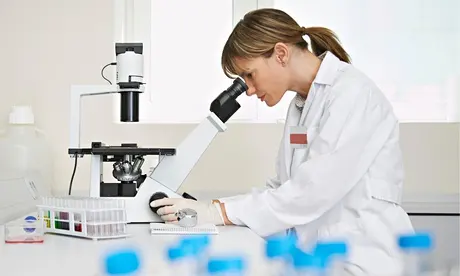
DNA
Precision Medicine in Cancer Treatment Therapy
Precision medicine is known for using the genetic changes in a patient’s tumor to determine their treatment.
Based on a genetic understanding of their disease – precision medicine is an approach to patient care that allows doctors to select treatments that are most likely to help patients. And based on this may also be called personalized medicine. Recent advances in science and technology have helped speed up the pace of this area of research although the idea of precision medicine is not new.
When you are diagnosed with cancer, you commonly receive the same treatment as others who have the same type and stage of cancer. Even so, different people may respond differently, and, until recently, doctors didn’t know why.
After decades of research, scientists now understand that patients’ tumors have genetic changes that cause cancer to grow and spread. They have also learned that the changes that occur in one person’s cancer may not occur in others who have the same type of cancer. The same cancer-causing changes may be found in different types of cancer.
How Genetic Changes in Your Cancer Are Identified?
To figure out which genetic changes are in your cancer, you may need to have a biopsy. A biopsy is a procedure in which your doctor removes a sample of cancer. This sample will be sent to a special lab, where a machine called a DNA sequencer looks for genetic changes that may be causing cancer to grow.
The process of looking for genetic changes in cancer may be called DNA sequencing, genomic testing, molecular profiling, or tumor profiling.
From molecular fingerprinting of the tumor to a personalized treatment strategy.
Tests aim is to check whether treating patients with treatments that target the cancer-causing genetic changes in their tumors, no matter where cancer develops in the body, will help them. Many of these treatments are drugs known as targeted cancer therapies.
Currently, if you need treatment for cancer, you may receive a combination of treatments with an integrative approach, including surgery, chemotherapy, radiation therapy, immunotherapy, and complementary. Which treatments you receive usually will depend on the type of cancer, its size, and whether it has spread.
With precision medicine, information about genetic changes in your tumor can help decide which treatment will work best for you. There are drugs that have been proven effective against cancers with specific genetic changes and are approved. Approved treatments should be available wherever you have cancer treatment.
Blood tests for tumor markers, also known as tumor markers, are commonly used in cancer patients to assess the presence and progression of cancer. These tests measure specific substances or proteins that are produced by cancer cells or normal cells in response to cancer.
It's important to note that tumor markers are not definitive diagnostic tests for cancer, but they can provide valuable information as part of a comprehensive diagnostic and monitoring strategy. Blood tests for immune response can help assess the functioning of the immune system and evaluate the body's immune response to various diseases or infections. These tests can provide valuable information about the immune system's activity, identify any deficiencies or abnormalities, and aid in diagnosing certain immune-related conditions.
Blood tests for vitamins and trace elements can help evaluate the levels of these essential nutrients in the body. These tests can be useful in assessing nutritional deficiencies or imbalances, monitoring supplementation or dietary changes, and identifying potential underlying health conditions.
Here are some commonly measured vitamins and trace elements in blood tests:
- Vitamin D: Blood tests can measure the level of 25-hydroxyvitamin D [25(OH)D], which is the main circulating form of vitamin D. Vitamin D is important for bone health, immune function, and other physiological processes.
- Vitamin B12 and Folate: These tests measure the levels of vitamin B12 and folate (vitamin B9). Deficiencies in these vitamins can lead to anaemia and neurological problems.
- Iron and Ferritin: Iron tests assess the body's iron levels and its ability to transport oxygen. Ferritin is a protein that stores iron. Low levels of iron or ferritin can indicate iron deficiency anaemia.
- Zinc: Zinc is an essential trace element involved in various metabolic processes and immune functions. Blood tests can measure zinc levels to assess deficiency or excess.
- Copper: Copper is another trace element necessary for the proper growth, development, and functioning of various enzymes in the body. Blood tests can evaluate copper levels.
- Magnesium: Magnesium plays a role in muscle and nerve function, energy production, and bone health. Blood tests can measure magnesium levels.
- Selenium: Selenium is an important antioxidant mineral involved in immune function and thyroid health. Blood tests can assess selenium levels.
Complete Blood Count (CBC)
A CBC measures the levels of different blood cells, including white blood cells (WBCs), which are an essential part of the immune system. It provides information about the total WBC count and the proportions of different types of WBCs, such as neutrophils, lymphocytes, monocytes, eosinophils, and basophils.
Share
Before undergoing infusion therapy, it's important to ask your doctor or healthcare provider several questions to ensure that you are well-prepared and that the procedure goes smoothly.
Here are some questions you might consider asking:
- What specific medication or solution will be used in the infusion?
- How long will the infusion session take?
- Are there any special instructions I need to follow before the infusion?
- Should I eat or drink anything before the procedure?
- What are the potential side effects or risks associated with this therapy?
- Could you explain the process of the infusion to me?
- How can I contact medical staff if I have questions or issues during or after the infusion?
- Do I have any known medications or allergies that could affect this procedure?
- Could this therapy interact with any other medications I'm currently taking?
- What symptoms or side effects should I report after the infusion?
- How often will I need to receive this therapy?
- Are there any tests I need to have before or after the infusion?
- What are the expected benefits of this infusion therapy?
- Are there any dietary or activity restrictions I should follow before or after the infusion?
- How will I know if the infusion therapy is working for me?
- Is there any additional information or resources you can provide to help me understand this therapy better?
These questions can help you gain a clearer understanding of the infusion therapy, its purpose, and what to expect.
Important!
Open communication with your healthcare provider is key to ensuring that you have a safe and effective treatment experience.









